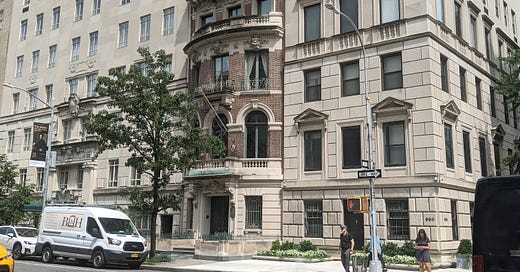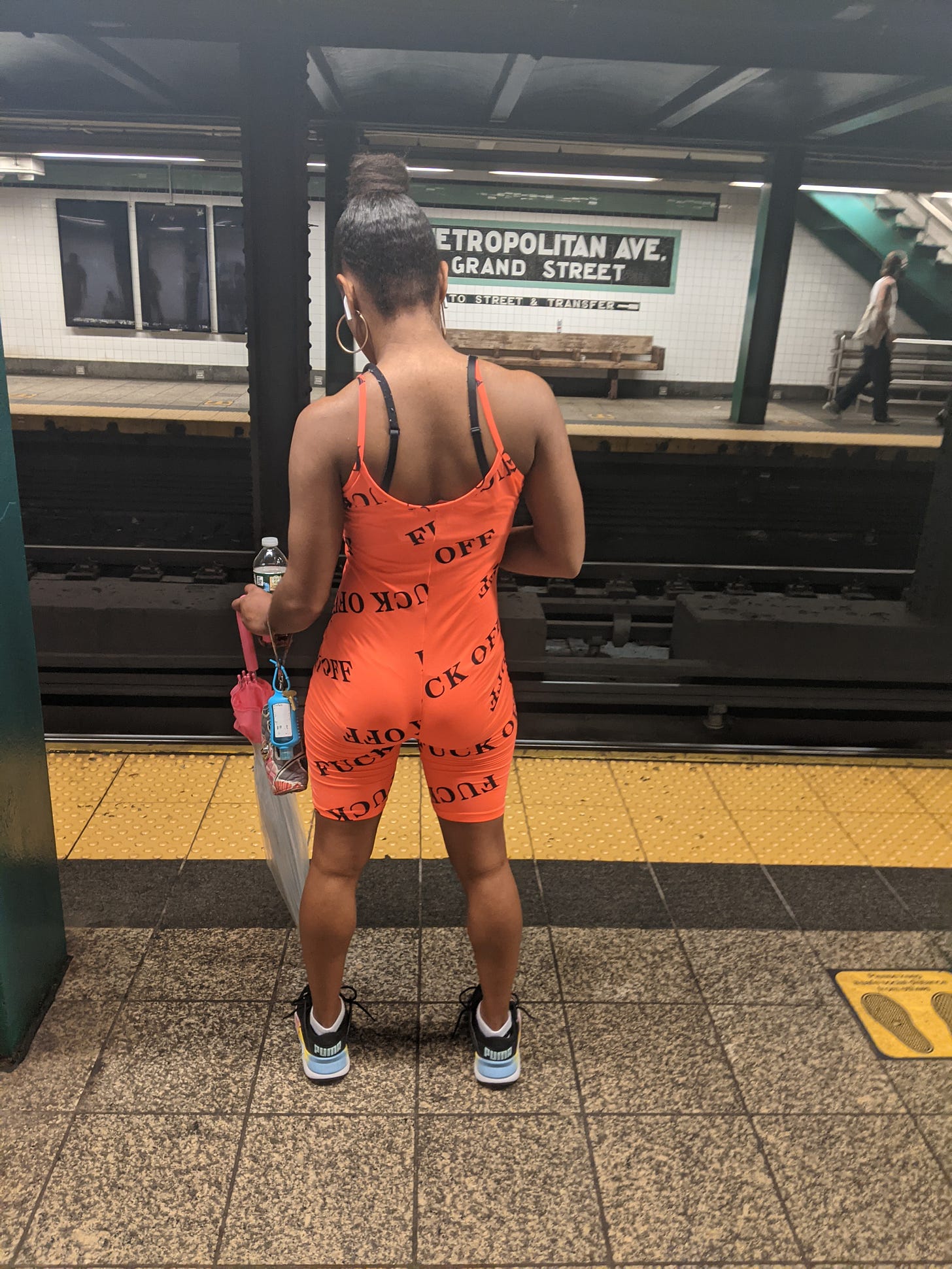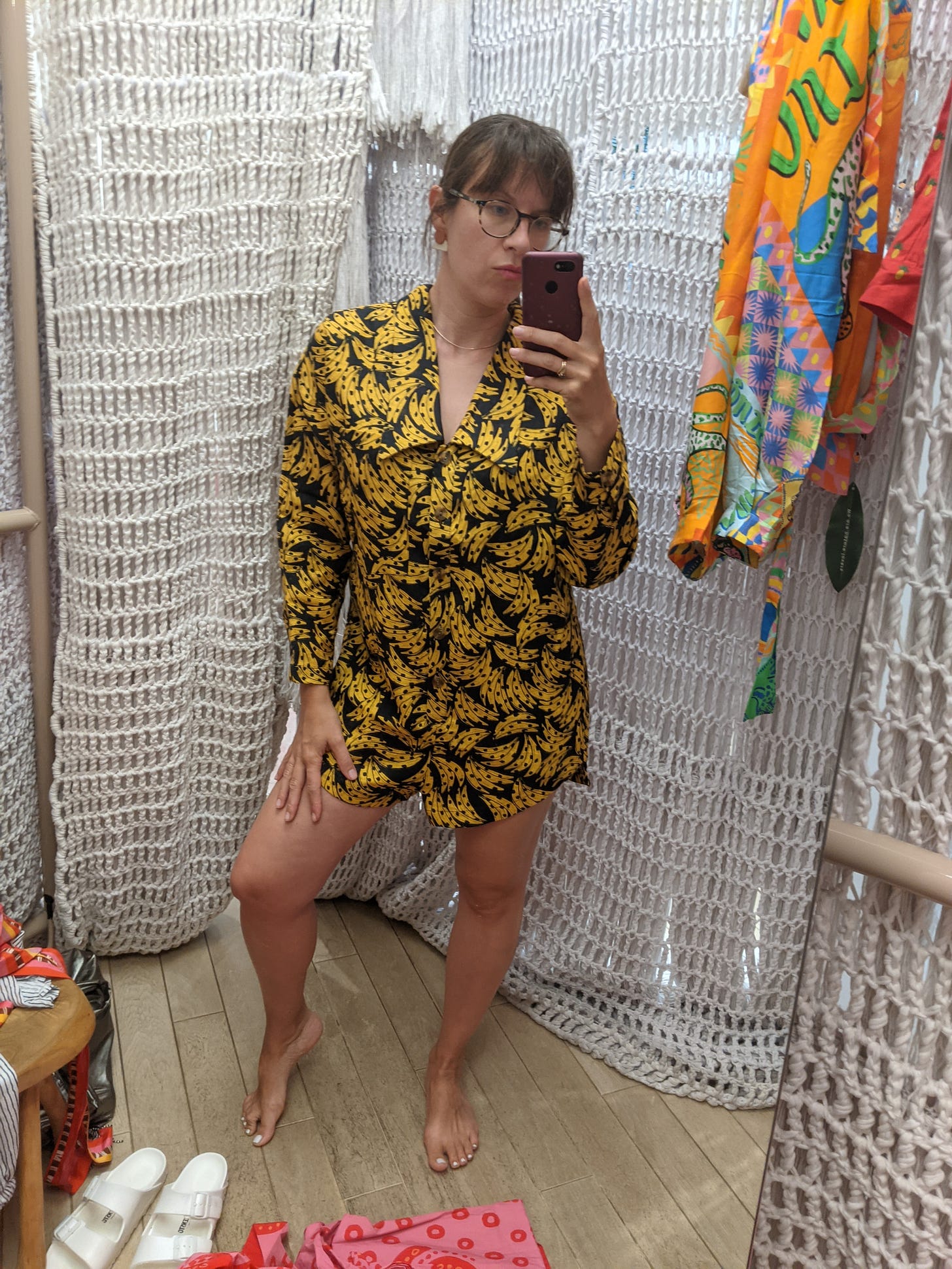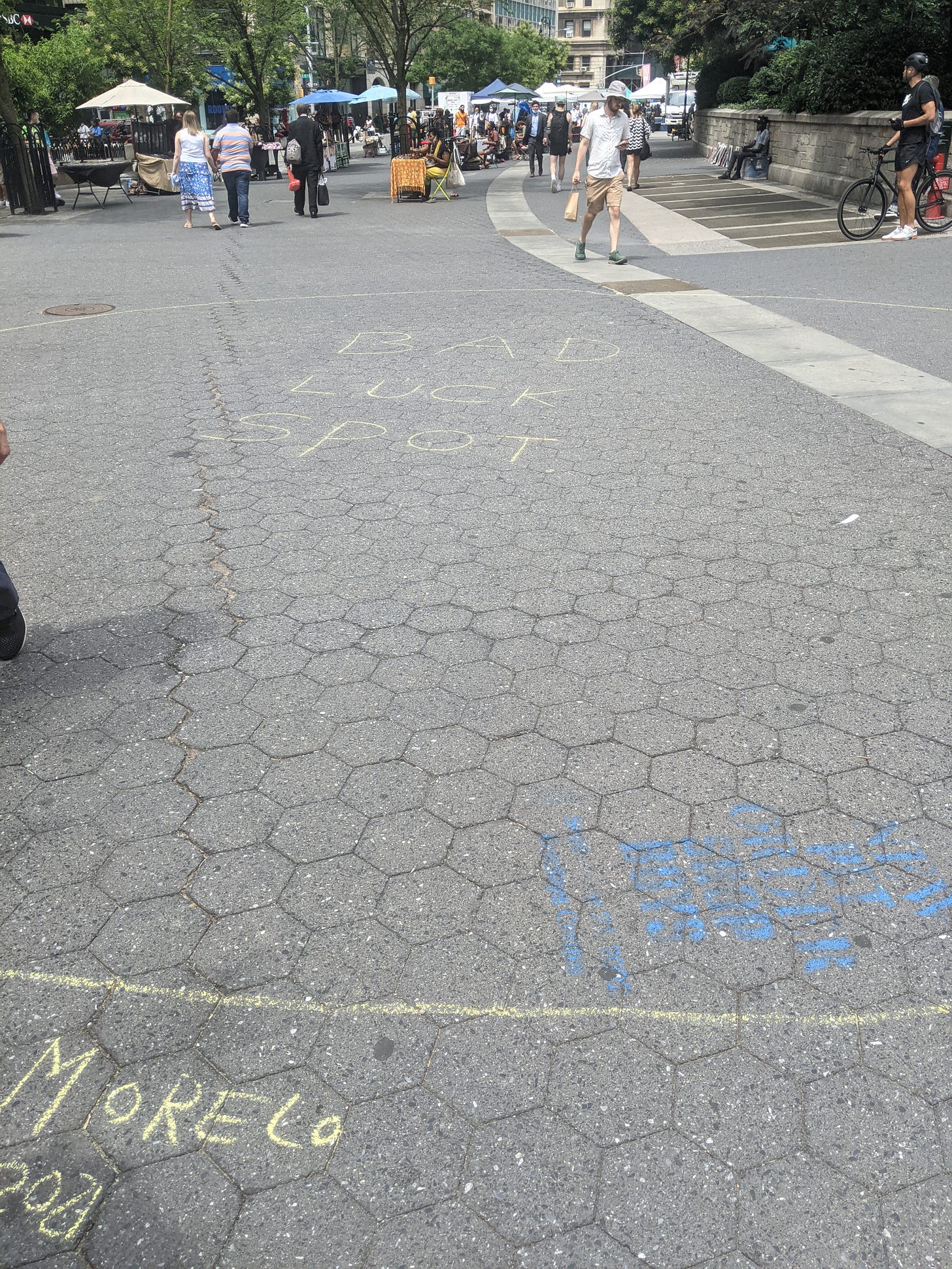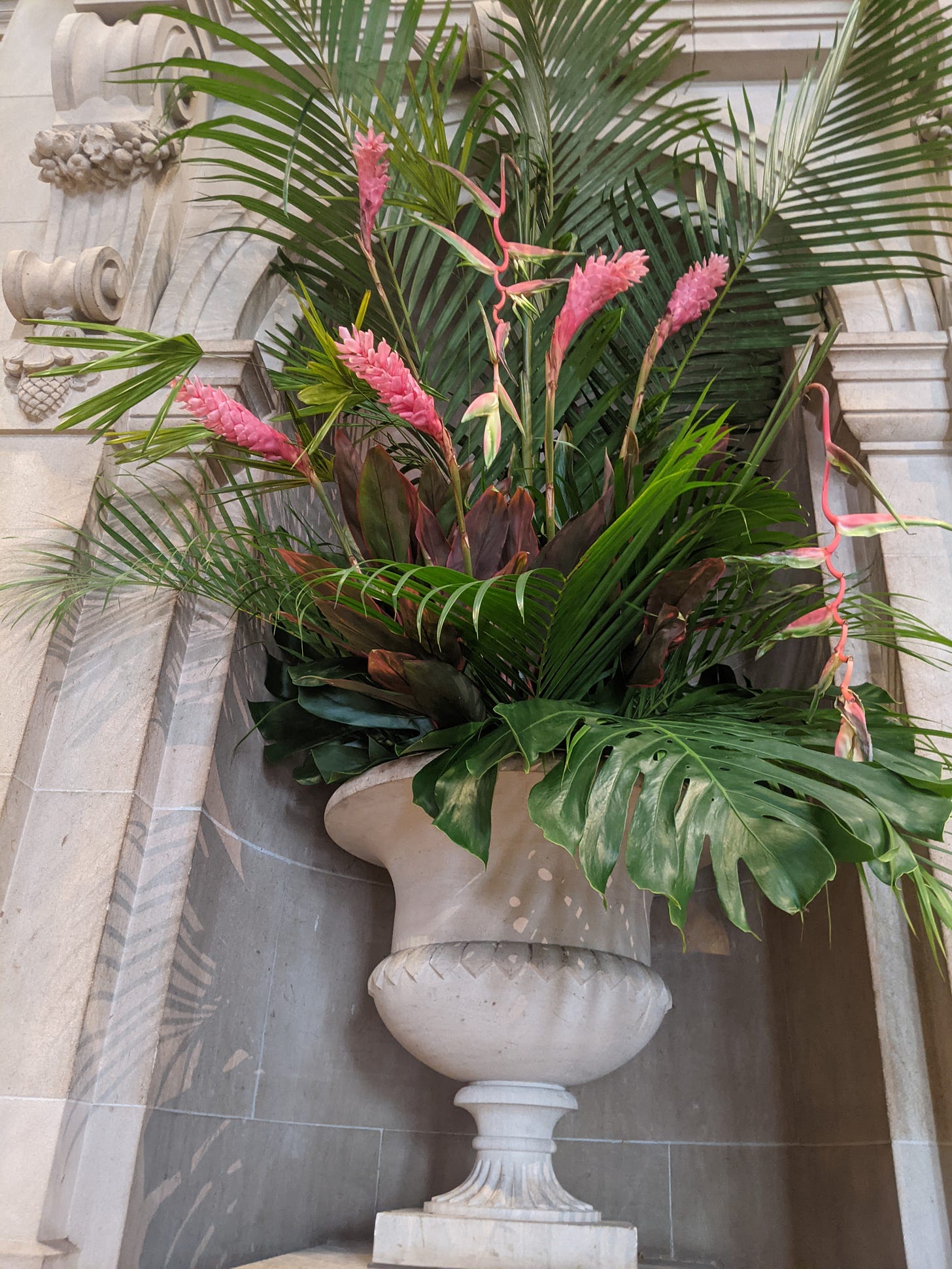Trigger warning: This article contains references to the extreme privilege of being able to safely abandon your children for five days. Read with caution.
Friday Morning
I am on an Amtrak train, speeding towards New York and away from my children, who are now in the care of my mother and step-father. May they go with God. My head is a bag of nails. Last night, I fell asleep with my son, but at two in the morning my daughter woke up screaming, and would not let her father touch her, and I was summoned, and so the two of us discussed the benign nature of shadows and visualized playing in “the deep” of the ocean with her favorite friend, and by 7am I was clinging to the edge of the mattress with her delicious body, spread out as wide as physically possible, powered-down beside me.
I help a woman in the train station pharmacy remember the english word for “nail file.” I get an iced latte and a bagel sandwich, and I eat just the amount of it that I am hungry for, no more, no less. I go to the bathroom the instant that I register the need in my body. It is good.
I have been apart from my children for less than two hours, and I miss them. All I have done for the past several days is wish to be free of them, perhaps wish is too peaceful of a word, and now I am, and I miss them. I knew this would happen, it is just basic psychology. But what surprises me is how the gnarled knot of resentment and suffocation and at-my-limit-ness I was feeling just hours ago has simply melted away. I thought it would take longer.
On the train, I gaze out the window, listening to Carvell Wallace’s podcast about Fred Rogers, and remembering that I really like children, love them, in fact. A deep respect for children has been one of the unifying forces of my existence, but I am often so ragged from rearing my own that I have a hard time accessing it anymore. Why haven’t I been making my kids watch “Mr. Rogers Neighborhood,” instead of that garbage show about dragons??? It is probably too late to save them now.
Friday Evening
I walk through the Union Square Farmer’s market. A man walks by shouting “Easy money! Easy money!” into his phone. I am the only person, it seems, who does not know where they are going. I had forgotten how intimate it is sit down in a seat that has just recently been vacated by another person, that is still warm from a stranger’s ass. My head is still clanging. It is trying to remember all of the ideas I have for spending time on my own that only come to me when I am with my children. A chalkboard advertising iced tea says “do what puts you in your heart.”
What scares me is the feeling that if I stay away from my children long enough I will become irrelevant, and if I didn't become a mother to make myself the center of someone’s universe, then why the hell did I do it?
A man on the train, who is very grown, has a backpack shaped like captain America's shield. I walk next to him for as long as I can in the transfer tunnel—it makes me feel safe. The latest census says that there is only a 20-percent chance that he has a child under 18 in the home, and this number is dropping every year. But I have a sense that Captain America is a father.
Saturday Afternoon
I walk alone in the rain to a gallery. My husband and I play-act at collecting art. We go to a dance party in the backyard of a Brooklyn bar. I am certain that it will be too overwhelming for me, so I tell my husband I will meet him there, but when I finally make it, dripping with subway sweat, I find that it is nice to see our old friends and to dance and when Biz Markie’s “Just a Friend” comes on we all gather in a circle and sing and utter our respects and I realize that I don’t do enough collective grieving. I complement a stranger on her mushroom earrings and suddenly actual psychedelic mushrooms are being thrust into my hands.
I take a Citi-bike, which is now just a two-wheeled Lyft, by myself, to a stand-up show in Williamsburg. Everyone is very young and very tall, or does their youth just make them seem further from the ground? I am easily the oldest person in the room. None of the comedians, who are also young, talk about parenting, except for a very tall guy who tell us “People always ask if my parents are tall. As if I didn’t work hard for this.”
There are brilliant jokes and lazy ones, sometimes in the span of the same minute. I truly believe that the next generation is more open and intersectional and political than mine, and that the last year-and-a-half has completely changed the landscape of our shared cultural consciousness. But, also, even the youth are still laughing at fat jokes.
Sunday Morning
Someone has drawn a giant circle outside the train station with the words “Bad Luck Spot” written inside. When I see it I quickly reverse course—I am not so brazen as to think I can welcome bad luck. I stop and watch for a few minutes, expecting other superstitious reactions, but no one seems to notice it. A man with an unlit cigarette in his mouth and a large watermelon tucked under his arm saunters right through the middle, right over the words, cool as can be.
I try on clothing in SoHo. A woman my age or how old I think I look talks distraughtly into her phone, “He said it’s just too hard being with someone like me.” The friend on the other line seems like a good listener. I try on a banana-print romper and all I can think of is Bananas Gorilla, the Busytown banana thief, who I always turn into a girl when I read Richard Scarry to my daughter, because girls can steal bananas, too. I purchase a red and pink pantsuit with balloon sleeves and octopuses printed all over it because it is what the version of myself that is in this store, without her children, would wear.
Sunday Evening
I pass another “Bad Luck Spot,” this one much smaller than the first. I wonder, if I walk around this city long enough, if I will see a good luck spot. Somehow I doubt it.
A woman hands out Pokemon masks, for some reason, and a man in a basketball jersey saunters up to her, smiling and holding out his hand, and says proudly “You know, I was diagnosed a man-child!”
All of the fashion-hunting has made me late for another thing, but even this is a delight, to inconvenience others because of your own indulgences. Even though I am late, I stop briefly at a Mr. Frostee truck. A little girl passes by me and yells “OH! ICE CREAM!” As I catch her mother’s eye, licking the drips from my cone, I imagine that her look says “thanks a lot, you childless cunt,” and smile.
Monday Afternoon
I walk to the Metropolitan museum in my octopus suit, feeling like a trillion bucks, because a million doesn’t even get you that far these days. No one seems to appreciate how put-together I am. Once, when my sister was in her 40’s, a young dude passed by her and yelled, “Yeah! You still got it!” Her response was — “Still?!!!” At the time I agreed with her offense, but now I think I would be happy to have it, even if it is still.
Waters are $3 in Chelsea and $1.50 in NoHo and $4 on the Upper East Side. On a table of books at the foot of the museum steps, one, written by a man, is titled “Never Split The Difference: Negotiating As If Your Life Depended On It.”
I see the Alice Neel exhibit, which is full of haunting portraits. She painted and talked about motherhood, and its tension with her own creative work, which she called an “awful dichotomy.” Next to one painting of a naked little girl, with her puffy little vulva, we learn that this is the “only surviving child” of Neel’s first marriage, and that she saw this daughter only twice. There is no other mention of this fact, no elaboration, anywhere I can find. I cannot look at her work without being haunted by this half-formed story, overlaying pain and incompleteness on everything I see. But, I think, perhaps this is progress—to have your failures as a mother be nothing but a passing comment.
There is a mommy group here, four or five women with babies under a year. One of the babies, in a pale yellow jumper and pink socks, who is smaller than my children ever were, I think, though there is no way this is true, passes by me and it is all I can do not to scoop her up. Outside the exhibit, a gentle older man is talking to the mothers, recommending something to them, I believe it is frozen bagels for their children to teeth on. “Enjoy every minute!” he directs them. And they assure him that they will.
Ancient art is lost on me, I once had something like a panic attack in the “old as fuck urns” section of the Louvre. Ancient Egypt is a bit better, all those cats and all that gold. Multiple museum employees give me directions to the first floor cafe with a nonchalance that implies that it is very easy to get there. I wander through Depression-era murals, twentieth-century vases, so much ridiculously-gilded furniture, a 15th century chess board, a collection of Chinese porcelain belonging to a Benjamin Altman. I wonder how Altman came by this porcelain—it is certainly not a nice story. The children here seem very well behaved, or else the naughty ones have been dragged home. No one comments on my octopus suit. Perhaps they are intimidated.
In the iconic main gallery of the museum, several vases are filled with exotic flowers, easily my height, A sign tells us that they are a gift of a Lila Acheson Wallace, most certainly dead. To leave money to provide the Metropolitan Museum with larger-than-life fresh flowers, seemingly forever, is, as my nieces would say, a flex. I wonder if Lila had children, and if she did, if they come here to remember her, or if they resent the fact that so much money was reallocated towards these flowers. Or both.
Tuesday Morning
All I want is to do is wander around museums, alone. Somehow it is the most childless thing I can think of doing. I stumble upon a stunning video installation by the artist Lynn Hershman Leeson. She recorded herself, over the course of 25 years, telling her life story, at first to no one in particular but because she felt that if she didn’t say it out loud, she wouldn’t believe herself that it was true. She was viciously abused as a child, left by her husband, severely eating-disordered, and at times used sex work as a way to support herself and her young daughter. In one of her later videos, where she is more confident and grounded than her earlier self, she discusses the state of womanhood with an old friend. “Women are revolutionaries,” she says. But because I have a minor hearing impairment as the result of a childhood illness, which is mostly not an issue but does cause problems during games of telephone or if I am seated next to someone quiet at a busy restaurant, or, say during an exhibit where competing audio recordings are being played in the same room at the same time, I hear “Women are revolutions.” I turn this phrase over and over in my mind. Women are uprisings—that is one definition, of course. But also, women are turnings, the orbiting of one object around another.
I walk out into the summer sunlight, order a lunch so large that my waiter raises his eyebrows in delight. A man on an orange motorcycle in Little Italy blasts Tevin Campbell and I sing along under my breath and remember that a friend told me there is no longer a single Italian-born person living in this neighborhood.
Tuesday Afternoon
I take the Long Island Railroad out of the city, towards my children, who will be my responsibility within the hour. A woman barks into her phone and her neighbor asks, “Is that your kids or your husband?!” “It’s my girlfriend,” she replies. “Oh,” says the neighbor, “that’s why you could talk to her like that! It’s good to have friends.” The daily reminder I have set on my phone pops-up: You’re a grown up.
I am really, really, excited to hug my kids. And as the train pulls into the station, and my husband readies himself at the doors, I linger until the last possible moment, until finally, I heft my bag over my shoulder, check my surroundings for lost belongings, and move on.


